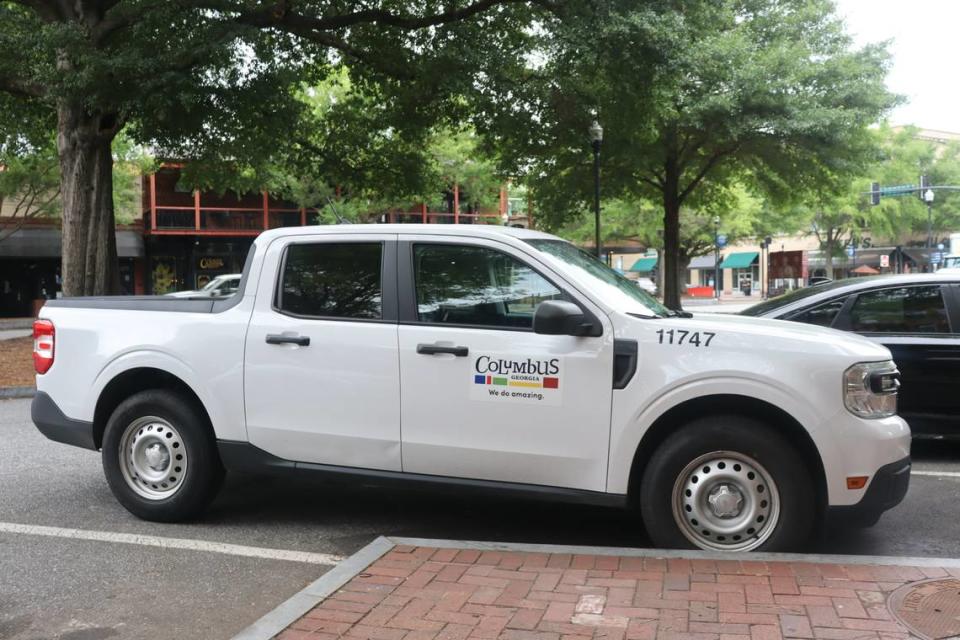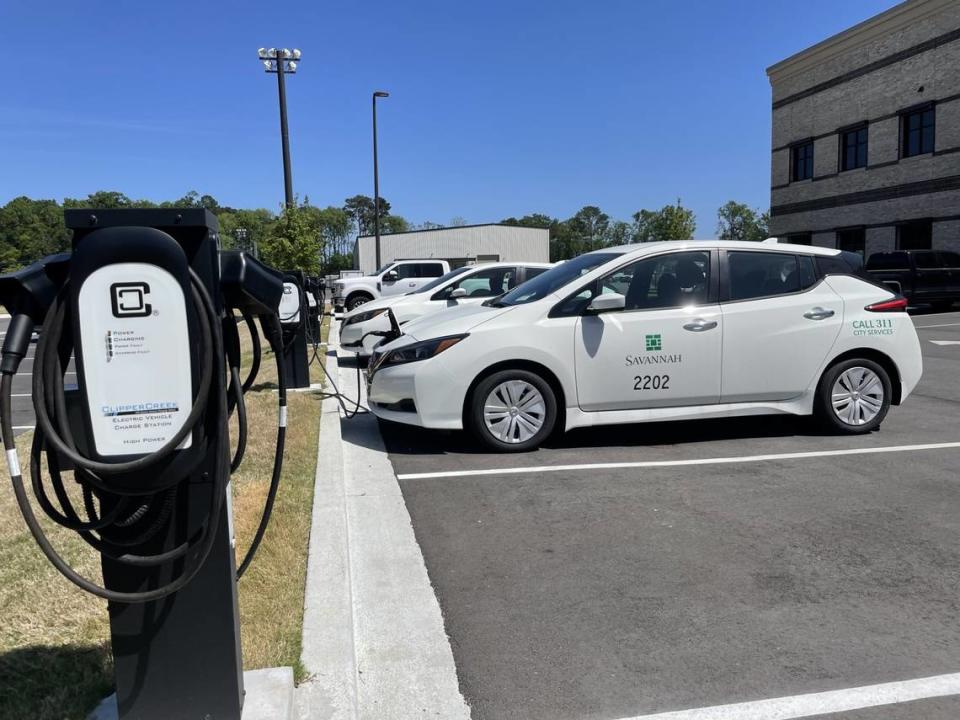3 of 5 major GA cities are driving electric fleet vehicles. Why aren’t Columbus and Macon?
Columbus has not yet pulled a lever committing to transition any of itsnearly 4,000 city fleet vehicles to zero-emission electric vehicles. Nor has Macon.
While the other largest cities in the state are moving forward with converting their public vehicle fleets to electric, Columbus and Macon are not out of the starting gates yet, despite it being an effective step in combating climate change and public health.
The trend to make the switch started in cities across the country in places like Pennsylvania and Arizona years ago, and some over a decade ago.
Atlanta, Augusta, and Savannah are years into the process of replacing gas-powered vehicles with EVs in the city’s fleet. Savannah in particular has over a quarter of its light-duty vehicles electrified; achieving sustainability goals that save the city money and lower carbon emissions.
Transportation remains Muscogee and Bibb County’s highest source of planet-warming emissions, according to the emissions tracker report at climate solutions organization, Drawdown Georgia. Last year Muscogee County added 146,000 metric tons of emissions from transportation and Bibb County contributed 154,000 metric tons.
Electrifying the city fleet is a powerful step to reduce pollution and fight climate change while lowering fuel and maintenance costs and setting an example for the community.
Neither Columbus nor Macon has a plan in place suggesting EVs will change. (Aside from the four, $400,000 dollar zero-emission Uptown Shuttle that roams Uptown Columbus, falling under Metra’s domain).
Fleet managers in Columbus and Macon blame a lack of charging infrastructure, a small government purchasing windows to purchase city vehicles, and confidence that cities have successful transitioned.
“Charging infrastructure is a big deal,” Keith Butler, fleet manager for Macon-Bibb County said. “You can’t decide what infrastructure you put in place until you know what vehicles you are going to be charging, and government vehicle choices are scarce.”
Columbus’ fleet manager, Andrea Owens, also says looking into charging stations and the cost to place them is the next step in beginning to electrify. “I’m not saying [going electric] is something we can’t do,” he said. “The cost of the charging stations would require buy-in from council.”

“I guarantee there is a car somewhere that is driving circles that is very easy to electrify,” Matt Stephens-Rich, Director of Technical Services of Electrification Coalition said when speaking about Columbus’ opportunity to transition. “The average fleet vehicle travels just 30 to 50 miles per day.”
Parking enforcement vehicles or city codes and inspection enforcement vehicles, for example, are the low-hanging fruit that Stephens-Rich recommends starting with on the road to electrifying the fleets.
That is just what the City of Savannah did when it put together its sustainability plan in 2016.
Cities with Zero Emission Visions
Savannah Sustainability Director, Alicia Brown said the city passed a resolution in 2020 to be powered 100% through clean energy by 2035. In 2019 when two light-duty vehicles were up for renewal they opted for Nissan Leafs—after that, obtaining EVs snowballed from at least a dozen Level 2 chargers that were part of brand new public works building.
“We started with parking enforcement and code enforcement, then added city directors in our capital projects, development, special events, economic developments, and sustainability departments–which I drive,” Brown said.
We started with parking enforcement and code enforcement then added City directors in our Capital Projects, Development Services, Special Events, Economic Development, and Sustainability departments, among others.
Today, all of the 36 EVs Savannah has in its fleet are leased through Enterprise. They also have 91 hybrid vehicles which they use to take “out-of-town trips” like Toyota Corollas or Ford Focus which Brown said get 40 to 50 mpg.
Part of the reason Savannah leased the vehicles is the grants and tax credits from the Inflation Reduction Act and Bipartisan Infrastructure Law which gives tax credits and grants to ease the transition to EVs, which didn’t exist yet.

These laws which are pouring billions into the clean energy transition have made transitioning “easier now more than ever”, Stephens-Rich said.
Maintenance is reduced and fuel savings are high, Brown said. “Those are by far the biggest benefits,” she said. Plus, they are quieter than traditional engines.
“I would absolutely recommend this for other cities,” she said. “People come to Savannah for peace, it’s nice not adding to noise pollution and the urban heat island effect. Plus, I like modeling good environmental stewardship.”
Like Savannah, Augusta created a sustainability plan that held them accountable to a goal. In 2021, the City of Augusta released its Green Augusta--Climate Action Plan to invest in cleaner air and lowering carbon emissions by making 20% of Augusta’s fleet electric by 2023 and all non-emergency fleet vehicles replaced with zero emissions vehicles by 2031.
In November 2023, four electric charging stations were installed thanks to a partnership with Georgia Powers “Make Ready Program”.
The City of Augusta did not respond in time for publication of this article to give an exact update on the amount of electric vehicles in their fleet. However, the city proposed 21 in the Green Augusta presentation in 2021 that would be rented through Enterprise.
Atlanta’s goals started as early as 2010 to have one of the largest alternative fuel vehicle fleets in the US. By 2018 there were 69 EV charging stations and eight more installed by 2020 to reach the goal of 20% of the city’s fleet to be electric., according to the City’s Alternative Fuel Fleet Conversion Plan supported by the Electrification Coalition.
Today there are 85 EVs in the city’s fleet, including a handful of medium and heavy-duty vehicles., according to Chandra Farley, Atlanta’s Chief Sustainability officer.
“These alternative fuel vehicles produce substantially fewer greenhouse gas emissions and support the City’s goal to reduce GHG by 40% by 2030,” Farley wrote in an email. “Additionally, the City of Atlanta has an adopted goal to provide 100% clean energy for all Atlantans by 2035, which will foster a cleaner electricity fuel mix for electric vehicles.”
The City is pursuing Charging Fueling Infrastructure Grants to support their EV goals.
Fleet vehicles in Columbus and Macon
After someone raised interest from a city council meeting last year, Columbus’ Fleet Manager Andrea Owens did a “field-level analysis on efficiency and cost of transitioning to electric vehicles within public works”, he told the Ledger-Enquirer. He found Jacksonville and Miami, Florida are testing small batches of 10 or so EVs to see how the transition goes. Owens is waiting to see how the program fares for the Floridian cities. Owens did not say whether he spoke with Savannah, Augusta, or Atlanta.
“Fleet managers are less incentivized to take risks without having spoken to someone who has tried it,” Sumner Pomeroy, programs director of Clean Cities Georgia said. The small Georgia nonprofit, Clean Cities Georgia, helps bust myths and misinformation about EVs to advance clean transportation adoption. Pomeroy said there are certain applications where EVs make the most sense, particularly light-duty.
Owens was adamant that he is not willing to switch police or other emergency vehicles (which make up 1,255 of the 3,823 vehicles) to electric because of the range anxiety or reliability.
“I don’t want emergency vehicles in a situation where they can’t charge,” he said. “Firetrucks may be out at a scene for 6 hours, for example.”
Columbus has 389 vehicles that are non-emergency fleet vehicles, and Macon-Bibb County has about 280-300.
But, for the 389 non-emergency fleet vehicles that support departments like animal control or public works, for example, only Owens’ Florida analysis and a lack of charging infrastructure in Columbus are what hinder the electrification transition in Georgia’s third-largest city after Augusta and Atlanta.
However, infrastructure is what Pomeroy said most of the federal grants and tax credits are going toward.
“There is a lot of money for electric infrastructure planning but less for vehicles,” she said.
Electrification Coalition has a slew of resources to help cities understand how to leverage grant/credit money including EVFunding Finder and Drive EV Fleets. On May 30, 2024 they held a clean heavy-duty vehicle workshop explaining a $932 million dollar competitive grant that closes in July.
Owens said his next steps are looking at cost of placing charging stations. When the Ledger-Enquirer asked if he has looked into any tax credits or federal grants he said, “no”.
Keith Butler, Macon-Bibb County’s Fleet Vehicle manager, has been in the position for three years. He said he’s looked into this throughout the three years and said the EV transitioning is in a “gray area”.
He isn’t willing to lease vehicles, like Savannah did, but rather, purchase through a government contract window, which he said is small.
“We purchase in a government contract window that is only open for a certain amount of time like two to three weeks,” Butler said.
There is no sustainability or environmental department in either Columbus Consolidated Government or Macon-Bibb County.
“Our goal is to lower the emissions but we don’t have by a certain year or certain number,” Butler said.
Butler added Macon does have a dozen hybrid vehicles and is looking into more hybrid plug in electric options.


